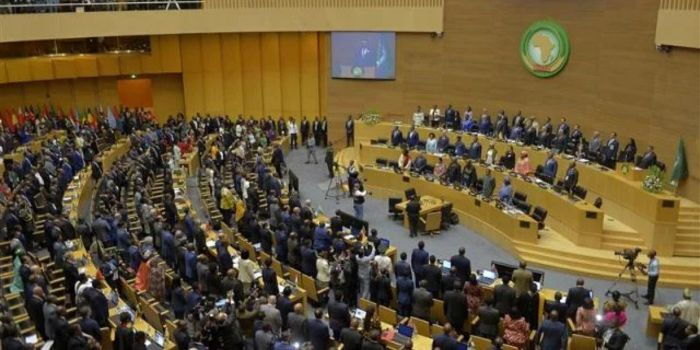The Chairperson of the African Union Commission is the Chief Executive Officer (CEO), and he is also the legal representative of the AU. He is also the Commission’s Chief Accounting Officer.
His functions include the overall responsibility for the Commission’s administration and finances, promoting and popularising the AU’s objectives.
Other roles include consulting and coordinating with key stakeholders like member states and appointing and managing commission staff.
The race for the AUC Chairperson began in May last year when the commission directed the Eastern region to submit the name of its preferred candidate for the top role while the Northern region was told to submit the name of a candidate for the role of Deputy Chairperson.
President William Ruto with a section of African Union leaders during the opening session of the Retreat of the Extended Bureau on the Implementation of Institutional Reforms of the African Union, State House, Nairobi on January 27, 2025.
Photo
PCS
Potential candidates were given up to August 6, 2024, to submit the names of their nominees. Besides the names, the regions were also directed to submit the candidates’ academic documents and academic qualifications.
A panel of eminent Africans, composed of five people, was established to oversee the pre-selection of candidatures for the eight positions. It was during this process that former Prime Minister Raila Odinga received approval to run for the seat.
How Economic Blocs Influence Voting Pattern
Economic blocs are important during African Union Commission elections because the voting shares of these blocs can impact the outcome of elections.
There are eight economic blocs within the African Union, including the Arab Maghreb Union (UMA), the Common Market for Eastern and Southern Africa (COMESA), and the Community of Sahel-Saharan States (CSSS).
Others are the East African Community (EAC), the Economic Community of Central African States (ECCAS), the Economic Community of West African States (ECOWAS), the Intergovernmental Authority on Development (IGAD), and the Southern African Development Community (SADC).
The economic blocs within the African Union can also influence elections for leadership positions by creating a bloc-based voting pattern. Larger and more influential economic blocs can use their collective power to push for the election of their preferred candidate.
Since his approval in August last year, Raila has been on a mission across the continent in a bid to secure votes for his AUC chairmanship.
Backed by his former political rival, President William Ruto, Raila has so far garnered support from 19 countries. These countries include Kenya, Togo, Gambia, Senegal, Guinea-Bissau, Zambia, and Zimbabwe.
Others are Tanzania, Uganda, the Seychelles, Mauritius, Rwanda, Burundi, Algeria, South Sudan, Eritrea, Equatorial Guinea, the Democratic Republic of the Congo, and Malawi.
Procedure of voting
With the AU Commission chairperson elections set for Saturday, February 15, regional leaders from the 55 African Union member states have already arrived in Addis Ababa, Ethiopia.
The contest to succeed Moussa Faki features three interested contenders among them Kenya’s Raila Odinga, Djibouti’s Mohamoud Youssouf, and Richard Randriamandrato of Madagascar.
Voting begins with the election of the AUC chairperson, followed by the deputy chairperson and then commissioners who are elected by the Executive Council.
The voting process is done in a secret ballot, and the candidate who garners two-thirds of the majority is declared the winner.
If any of the candidates fail to meet the two-third threshold, then the voting goes into the next round until a candidate achieves the set threshold.
An African Union Commission Chairperson is elected every four years, and it is renewable once.
A photo collage of African Union Commission Chairperson candidates Mahmoud Ali Yousouff (Djibouti), Richard Randriamandrato (Mauritius) and Raila Odinga (Kenya).
Photo
Mwanawanjuguna


